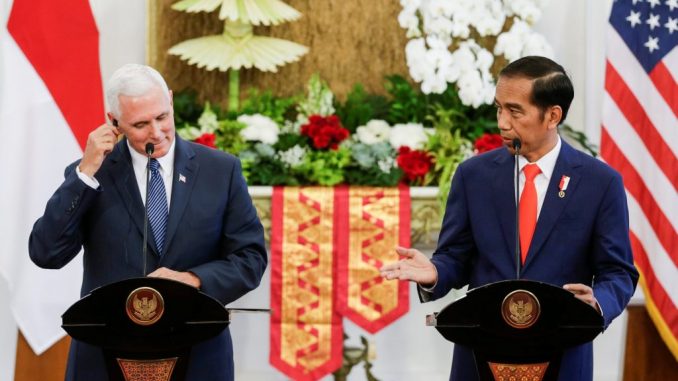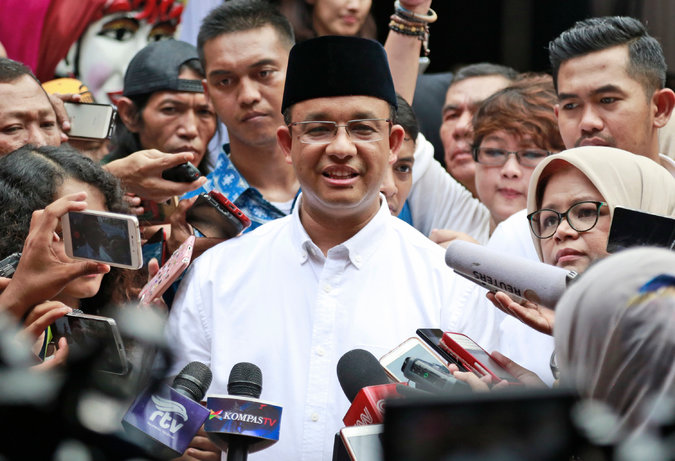
Anti-Chinese & anti-Christian slurs became widely spread on social media during campaign. Local mosques said it was “haram” for Muslims to vote for non-Muslims. Gov Basuki Tjahaja Purnama, an ethnically Chinese Christian, was charged with trumped-up “blasphemy against Islam” after lightheartedly citing Quran verse warning Muslims not to have Christian or Jewish friends. Given Indonesia’s post-Suharto transition to democracy in the late 1990s, he said, it should be acceptable for Muslims to vote for a Christian. In a total population of 250 million, Indonesia has more than 190 million Muslims & smaller numbers of Christians, Hindus and Buddhists. “It’s a challenge for Indonesia’s democracy. It shows right-wing Islamization is deepening, especially in cities & metropolitan areas.” Top: Moron Pence w Indo President Joko Widodo, a secular liberal who supported Basuki. Bottom: Polling station under a bridge in Jakarta Wednesday.
The ethnically Chinese and Christian governor of Jakarta, the Indonesian capital, lost a bitterly contested race on Wednesday,
one widely seen as a now-failed test of religious and ethnic tolerance in the world’s most populous Muslim-majority nation.
Just hours after the polls closed, the governor, Basuki Tjahaja Purnama, conceded defeat
to his main challenger, Anies Baswedan, a former minister of education, who had a commanding lead in the voting.
Basuki congratulated Anies and implored his supporters to “forget all the things that happened during the campaign” —
a reference to the religious and racially charged nature of the election,
in which Sunni political Islamists set the agenda,
including a trumped-up “blasphemy against Islam” criminal trial against Basuki.
Crucial issues for Jakarta’s voters include
- public education,
- health care,
- transportation,
- infrastructure development
- and chronic flooding.
But those were overshadowed during the campaign by issues of religion and race in a manner scarcely seen in Indonesia’s democratic era,
with anti-Chinese and anti-Christian slurs having been widely spread on social media in recent months.
Some local mosques posted banners saying it was forbidden for Muslims to vote for a non-Muslim candidate.
Basuki was charged with blasphemy after lightheartedly citing a verse in the Quran last September that warns Muslims against taking Christians and Jews as friends.
He said that, given Indonesia’s transition to democracy in the late 1990s after Suharto,
it should be acceptable for Muslims to cast ballots for a Christian.
In a total population of 250 million, Indonesia has more than 190 million Muslims and smaller numbers of Christians, Hindus and Buddhists.
Official results by the General Elections Commission of Indonesia will not be released until next week.
Basuki, who is ethnic Chinese, is only the second non-Muslim governor of Jakarta, the country’s capital and a city of about 10 million.
He was trying to become its first directly elected non-Muslim leader.
Popularly known as Ahok, Basuki was elevated from deputy governor in 2014
after his predecessor, Joko Widodo, won the country’s presidential election.
In the end, it was a crushing defeat for Basuki.
Opinion polls just before the election had suggested that he was in a dead heat with Anies, who is Muslim.
At one point last year, Basuki held a double-digit lead in the polls,
but his candidacy was hobbled by a criminal trial in which he was accused of blasphemy against Islam.
He and his supporters say the court case —
prompted by large demonstrations in the capital by political Islamist groups demanding he be prosecuted, or publicly lynched —
was orchestrated by his political opponents to sabotage his campaign.
Analysts said Basuki could not recover from the damage of political Islamist groups using religion as a political weapon,
despite a decades-old government regulation banning such tactics.
“It’s a challenge for Indonesia’s democracy,”
said Bonar Tigor Naipospos, vice chairman of the executive board of the Setara Institute for Democracy and Peace, a research institute in Jakarta.
“It shows to me that Islamization is deepening in society, especially in urban areas and cities,” he said.
He added that Basuki’s defeat would embolden hard-line Islamic groups to further pressure the Jakarta and national governments
to put in place a political Islamist agenda, including instituting Islamic law and banning the sale of alcohol.
In conceding defeat, Basuki noted that he would complete his remaining six months in office, ignoring calls from Islamists to resign.
Anies Baswedan in Jakarta on Wednesday. Baswedan, an exponent of political Islam and a former minister of education, held a commanding lead in the voting.
Addressing his supporters, Anies called the governor a “son of the nation”
and promised to resolve the capital’s problems, saying “our journey is still long.”
Anies, a former university rector, was an adviser to Joko during his 2014 presidential campaign, and he was later a cabinet minister.
Anies did not personally direct religious and ethnic attacks against Basuki,
but he met with hard-line Islamic leaders during the campaign and toured mosques.
“I would call it a resounding victory for Anies,” said Kevin Evans, a political analyst in Jakarta.
“What’s more important to me is how this might mobilize the pluralists to get more engaged and push back against this creeping Islamist primordialism,” Evans added.
“If it energizes the center and left to start thinking seriously on these things, it wouldn’t be a bad thing.”
[ More wishful thinking from Westerners when confronted by the juggernaut of political Islam, especially in its Sunni variant. ]
The governor’s absurd trial resumes on Thursday.
Analysts said it was not known how an electoral defeat could affect his defense.
Source: Jakarta Governor Concedes Defeat in Religiously Tinged Election – The New York Times
